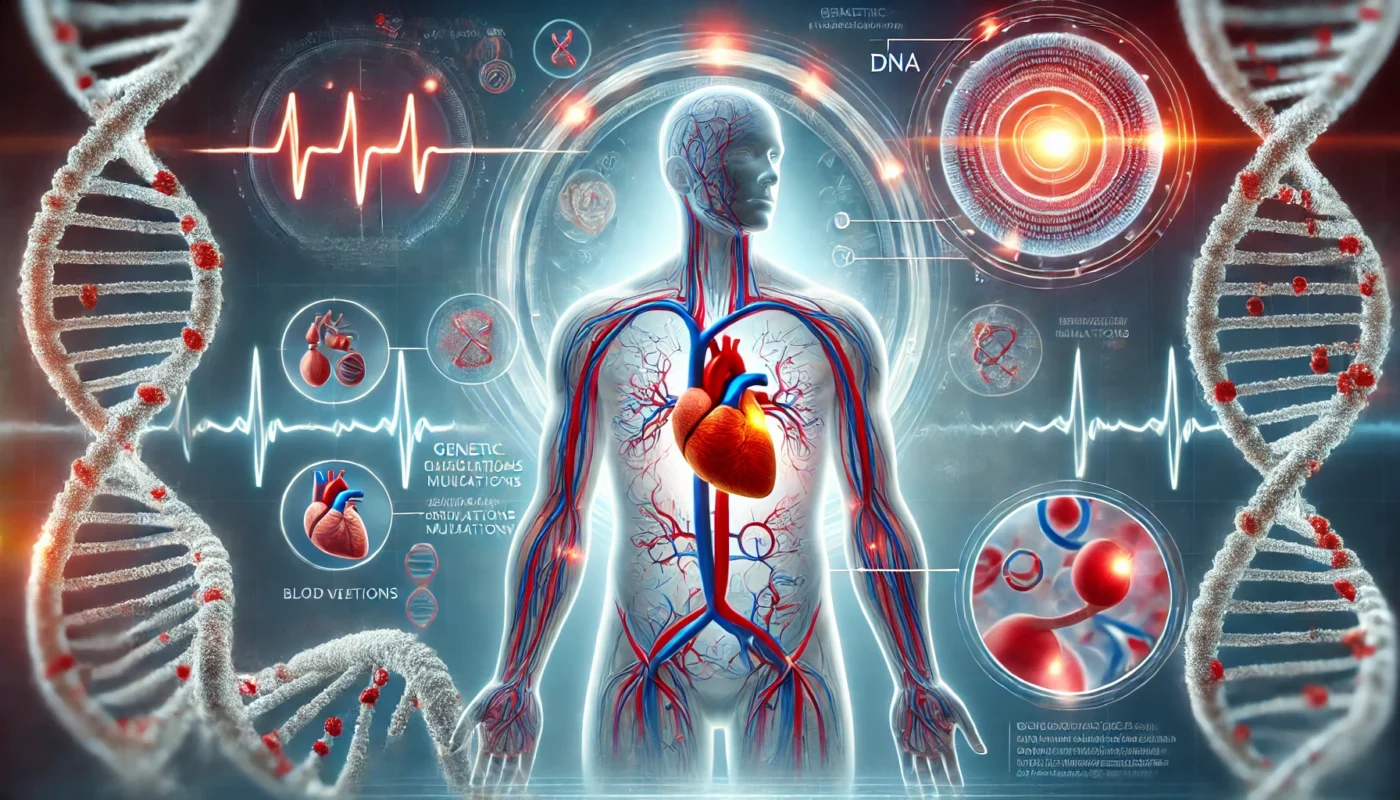Hypertension, or high blood pressure, is one of the most common chronic conditions worldwide, affecting over 1.28 billion people according to the World Health Organization (WHO). Defined as a persistent systolic blood pressure of 130 mmHg or higher or a diastolic blood pressure of 80 mmHg or higher, hypertension significantly increases the risk of cardiovascular diseases, kidney failure, and stroke. While lifestyle factors such as diet, exercise, and stress management are well-documented contributors to hypertension, a growing body of research underscores the role of genetics in the development of this condition. This article explores how hereditary factors influence hypertension risk, the interplay between genes and the environment, and evidence-based strategies for managing genetic predisposition.
You May Also Like:
Hypertension and Epigenetics: Unlocking Environmental Influences on Your Genes
The Role of Genetics in Hypertension: Are You Predisposed? is an original (HSLHealing) article.
Understanding the Genetic Basis of Hypertension
Hypertension is a multifactorial condition, meaning it arises from a combination of genetic, environmental, and lifestyle factors. Research indicates that approximately 30–50% of blood pressure variability can be attributed to genetic factors. Advances in genomics have identified hundreds of genetic loci associated with hypertension, offering valuable insights into the condition’s hereditary aspects.
How Genes Influence Blood Pressure
Genes can influence blood pressure through various mechanisms, including:
- Renin-Angiotensin-Aldosterone System (RAAS) Regulation
The RAAS is a hormone system that regulates blood pressure and fluid balance. Genetic variations in components of this system, such as the AGT gene encoding angiotensinogen or the ACE gene encoding angiotensin-converting enzyme, can lead to overactivation of RAAS, contributing to hypertension. - Sodium and Water Retention
Genetic mutations in renal salt-handling pathways can affect sodium reabsorption in the kidneys, leading to increased blood volume and elevated blood pressure. For example, variants in the SCNN1A gene, which encodes a sodium channel, have been linked to hypertension. - Vascular Tone and Resistance
Genes involved in vascular smooth muscle function, such as NOS3, which encodes endothelial nitric oxide synthase, can impact the dilation and constriction of blood vessels. Impaired nitric oxide production due to genetic variations is associated with increased vascular resistance. - Sympathetic Nervous System Activity
The sympathetic nervous system plays a key role in blood pressure regulation. Genetic differences in adrenergic receptors, such as the ADRB1 gene, can alter heart rate and vascular tone, influencing hypertension risk.

The Heritability of Hypertension: What Studies Show
Numerous studies have investigated the heritability of hypertension to quantify the contribution of genetics. Twin studies, family studies, and genome-wide association studies (GWAS) have been instrumental in understanding the genetic underpinnings of this condition.
Twin Studies
Research involving identical and fraternal twins has provided compelling evidence of hypertension’s genetic basis. A meta-analysis in Hypertension (2015) reported that the heritability of blood pressure ranges from 30% to 50%, with higher concordance rates observed in identical twins compared to fraternal twins.
Family Studies
Hypertension often clusters within families, with children of hypertensive parents being more likely to develop the condition. A longitudinal study published in The American Journal of Hypertension (2018) found that individuals with a parental history of hypertension had a 70% increased risk of developing high blood pressure compared to those without a family history.
Genome-Wide Association Studies (GWAS)
GWAS have identified over 1,000 genetic variants associated with hypertension. While each variant contributes a small effect, their cumulative impact significantly influences blood pressure. Notable genes include AGT, ACE, NOS3, and CYP11B2, which regulate blood pressure through pathways such as RAAS, vascular tone, and electrolyte balance.
Gene-Environment Interactions: The Role of Lifestyle
Although genetics play a substantial role in hypertension, they do not act in isolation. Environmental factors such as diet, physical activity, and stress interact with genetic predisposition, influencing blood pressure outcomes.
Sodium Intake and Genetic Susceptibility
High sodium intake is a well-known risk factor for hypertension, and genetic variations can amplify its effects. For instance, individuals with variants in the SCNN1A or SLC4A5 genes, which influence sodium handling, are more sensitive to dietary sodium. A study in The Journal of Hypertension (2020) found that sodium restriction led to a more pronounced reduction in blood pressure in individuals with salt-sensitive genetic variants.
Obesity and Genetic Risk
Obesity exacerbates genetic susceptibility to hypertension by increasing sympathetic nervous system activity, RAAS activation, and vascular inflammation. Research in Circulation (2019) demonstrated that individuals with a high genetic risk for hypertension who maintained a healthy weight had significantly lower blood pressure than those with obesity.
Physical Activity and Gene Expression
Exercise modulates the expression of genes involved in blood pressure regulation. A randomized controlled trial in Hypertension Research (2017) revealed that individuals with hypertension-associated genetic variants experienced significant reductions in blood pressure following a 12-week aerobic exercise program, underscoring the benefits of physical activity regardless of genetic predisposition.

Testing for Genetic Predisposition to Hypertension
Advances in genetic testing have made it possible to assess an individual’s risk of hypertension based on their genetic profile. Direct-to-consumer genetic testing services and specialized medical testing can identify variants associated with high blood pressure. However, the utility of genetic testing for hypertension remains debated.
Benefits of Genetic Testing
- Personalized Interventions: Identifying genetic predispositions can guide lifestyle modifications and medical treatments tailored to an individual’s risk factors.
- Early Detection: Genetic testing can identify individuals at risk before symptoms appear, enabling preventive measures.
Limitations of Genetic Testing
- Limited Predictive Value: Most genetic variants associated with hypertension have small individual effects, making it difficult to predict risk with high accuracy.
- Cost and Accessibility: Genetic testing may be expensive and is not universally available.
The Role of Nutritional Supplements
Nutritional supplements can complement lifestyle changes by addressing specific pathways influenced by genetics. Below are five supplements with evidence-based benefits:
- Omega-3 Fatty Acids
Omega-3s reduce inflammation and improve endothelial function. A meta-analysis in Hypertension (2018) demonstrated an average systolic blood pressure reduction of 4 mmHg with omega-3 supplementation. - Magnesium Glycinate
Magnesium supports vascular relaxation and reduces RAAS activity. A study in Magnesium Research (2016) reported a 5 mmHg reduction in systolic blood pressure with magnesium supplementation. - Hibiscus Extract
Hibiscus promotes nitric oxide production, improving vascular health. The Journal of Nutrition (2010) found a 6 mmHg reduction in systolic blood pressure with daily hibiscus tea consumption. - Coenzyme Q10 (CoQ10)
CoQ10 reduces oxidative stress and improves vascular health. A clinical trial in Hypertension Research (2014) found an 11 mmHg reduction in systolic blood pressure with CoQ10 supplementation. - L-arginine
L-arginine serves as a precursor to nitric oxide, improving vascular tone. A study in Nutrition Journal (2017) reported a 5 mmHg reduction in systolic blood pressure with supplementation.

Managing Your Genetic Risk for Hypertension
While genetics are not modifiable, lifestyle choices and medical interventions can mitigate the impact of hereditary factors. Below are evidence-based strategies for managing genetic risk:
1. Adopt a Heart-Healthy Diet
The DASH (Dietary Approaches to Stop Hypertension) diet is particularly effective for individuals with a genetic predisposition to hypertension. This eating plan emphasizes fruits, vegetables, whole grains, lean proteins, and low-fat dairy while limiting sodium, saturated fats, and added sugars.
- Evidence: A randomized controlled trial in The New England Journal of Medicine (2019) showed that individuals with a genetic predisposition to hypertension experienced an average systolic blood pressure reduction of 11 mmHg on the DASH diet.
2. Engage in Regular Physical Activity
Exercise reduces blood pressure by improving vascular function, reducing RAAS activation, and decreasing sympathetic nervous system activity.
- Guidelines: The WHO recommends at least 150 minutes of moderate-intensity aerobic exercise per week. Activities such as brisk walking, cycling, and swimming are particularly effective.
3. Maintain a Healthy Weight
Weight management is crucial for reducing genetic risk. Obesity amplifies the effects of hypertension-associated genes, making weight control a priority.
- Evidence: A study in The Lancet (2018) found that weight loss of 5–10% in individuals with a genetic predisposition to hypertension reduced systolic blood pressure by an average of 6 mmHg.
4. Limit Sodium and Alcohol Intake
For individuals with salt-sensitive genetic variants, reducing sodium intake to less than 2,300 mg per day can significantly lower blood pressure. Additionally, moderating alcohol consumption reduces vascular resistance and sympathetic nervous system activity.
5. Monitor Blood Pressure Regularly
Frequent blood pressure checks can help identify early elevations, enabling timely intervention. Home blood pressure monitors are a convenient way to track readings.
Conclusion
Genetics play a significant role in hypertension, influencing key pathways such as RAAS regulation, sodium handling, and vascular tone. While genetic predisposition cannot be altered, it does not guarantee the development of hypertension. By adopting heart-healthy lifestyle habits, engaging in regular physical activity, and considering targeted interventions such as supplements and genetic testing, individuals can effectively manage their risk. Understanding the interplay between genes and the environment empowers individuals to take control of their health and reduce the burden of hypertension-related complications.

References
- Hypertension Research. (2016). CoQ10 supplementation and blood pressure reduction. Hypertension Research. Retrieved from https://www.nature.com/hr
- The New England Journal of Medicine. (2019). DASH diet and blood pressure control in genetically predisposed individuals. The New England Journal of Medicine. Retrieved from https://www.nejm.org
- The Journal of Hypertension. (2020). Sodium sensitivity and genetic variations. The Journal of Hypertension. Retrieved from https://academic.oup.com
- Circulation. (2019). Obesity and genetic interactions in hypertension. Circulation. Retrieved from https://www.ahajournals.org
- The Lancet. (2018). Weight management and blood pressure reduction in individuals with hypertension. The Lancet. Retrieved from https://www.thelancet.com
Important Note: The information contained in this article is for general informational purposes only, and should not be construed as health or medical advice, nor is it intended to diagnose, prevent, treat, or cure any disease or health condition. Before embarking on any diet, fitness regimen, or program of nutritional supplementation, it is advisable to consult your healthcare professional in order to determine its safety and probable efficacy in terms of your individual state of health.
Regarding Nutritional Supplements Or Other Non-Prescription Health Products: If any nutritional supplements or other non-prescription health products are mentioned in the foregoing article, any claims or statements made about them have not been evaluated by the U.S. Food and Drug Administration, and such nutritional supplements or other health products are not intended to diagnose, treat, cure, or prevent any disease.

